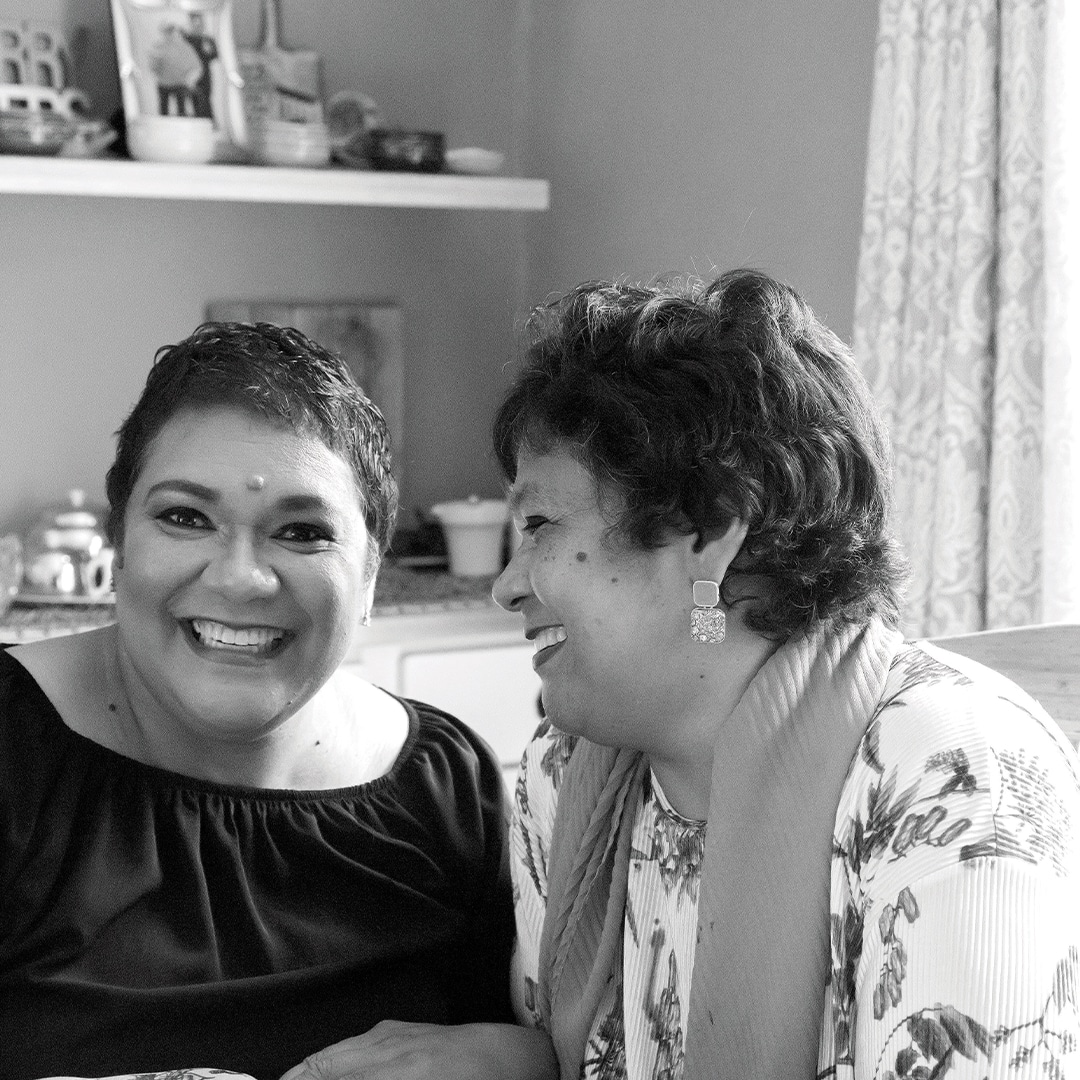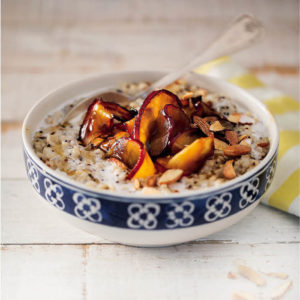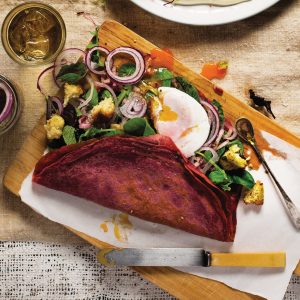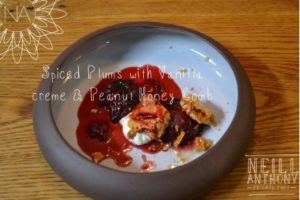We pay tribute to one of South Africa’s beloved personalities, a culinary visionary and the queen of Cape Malay cooking, heritage, and culture. Her infectious enthusiasm and warm and loving personality will live long in every recipe she has left behind.
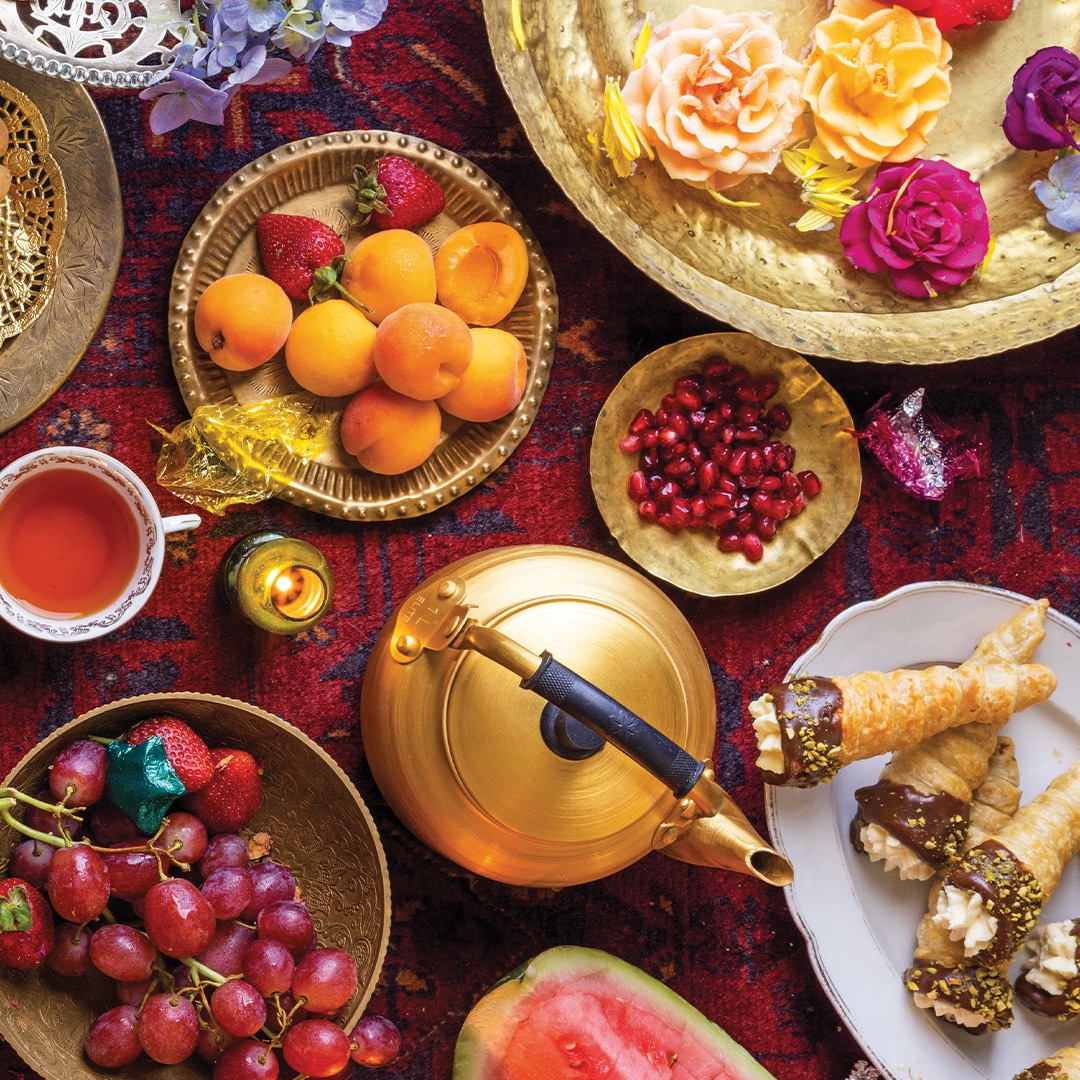
Fatima Sydow was born in the Cape Flats in Cape Town, South Africa. Her culinary journey began early in her childhood: “I remember like it was yesterday, the very first time mom called me to come and help her in the kitchen. I was only 9 years old with scruffy, wavy hair and big brown eyes. I would stop whatever I was doing at that moment and run barefoot in a sprint and in the kitchen I will be,” – and so a culinary luminary was born.
Fatima’s journey started alongside her mother, the late Waseela (née Davids) Sydow, where she would often help her with peeling potatoes and chopping onions – marvelling at the art of how her mother was able to perform culinary miracles with the simplest of ingredients. The food that came out of her mother’s kitchen would feed many, not only filling tummies but filling the soul.
Fast forward to 2011, Fatima started her Facebook page Cape Malay Cooking with Fatima Sydow where she’d share her rich heritage through comforting culinary creations that embraced the roots of her origins. As Fatima continued to share herself with the public, her social media prominence began to rise since it became clear that her journey was not just one of cooking; but a love story, a deep and heartfelt narrative of unity, sharing and the universal language that is food.
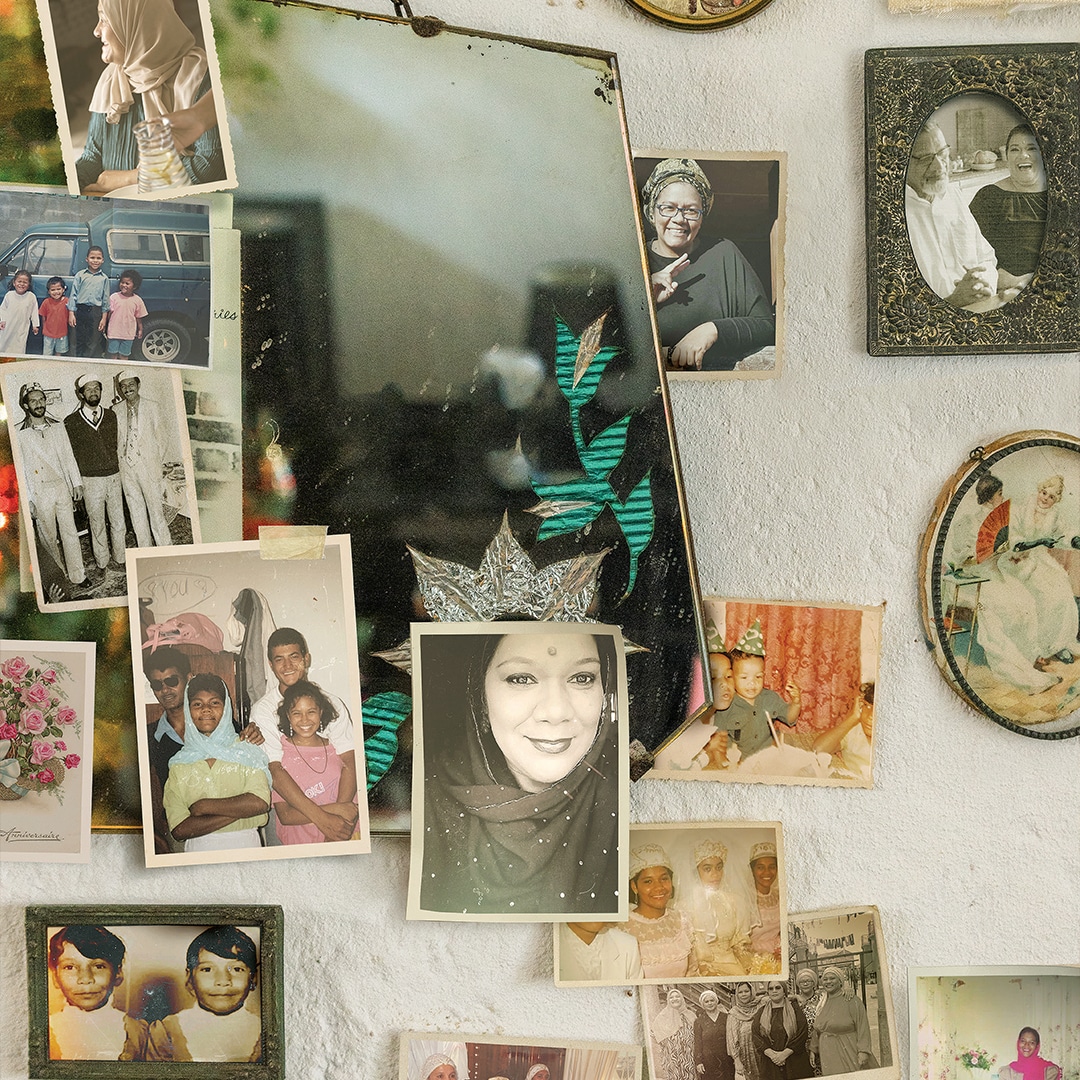
“On a chilly autumn morning in 2015, I took a deep breath and tightened my apron. There was something special and very different about that day… I could feel it in the air. I was excited, scared, nervous, thinking about what was about to take flight – not knowing that it would change my life and the course of my food journey and adventures forever.” – Fatima Sydow
Eggs, flour, sugar and blobs of silky soft butter were transformed into a rich, buttery biscuit dough ready to be shaped and baked. What was baking in that oven that day was the first recipe for her self-published cookbook The Journey of Cape Malay Cooking with Fatima Sydow, a book she managed to publish with little resources. Filled with the lessons and memories passed down by her late mother, this cook book resonated with so many readers both old and young thanks to its easy-to-follow steps and humble ingredients.
The doors to the culinary kingdom continued to open, welcoming all that Fatima had to offer. From her television show Kaap, Kerrie en Koesisters on ViaTV, co-hosted with her twin sister, Gadija Sydow Noordien. The TV show was originally scheduled to only run for one season, but became so popular that it led to a unprecedented six-season run, with the finale airing in 2019. This paved the way for Fatima’s second cookbook Cape, Curry, and Koesisters, published in 2019 and translated to Afrikaans. The pages are filled with a rich compilation of Cape Malay recipes from both Fatima and Gadija. From homemade masala mixes to make the most memorable curries and a killer dhaltjie recipe, to comforting potato pudding with stewed fruit (yes it’s a thing, a very delicious thing indeed!) and, of course, koesisters.
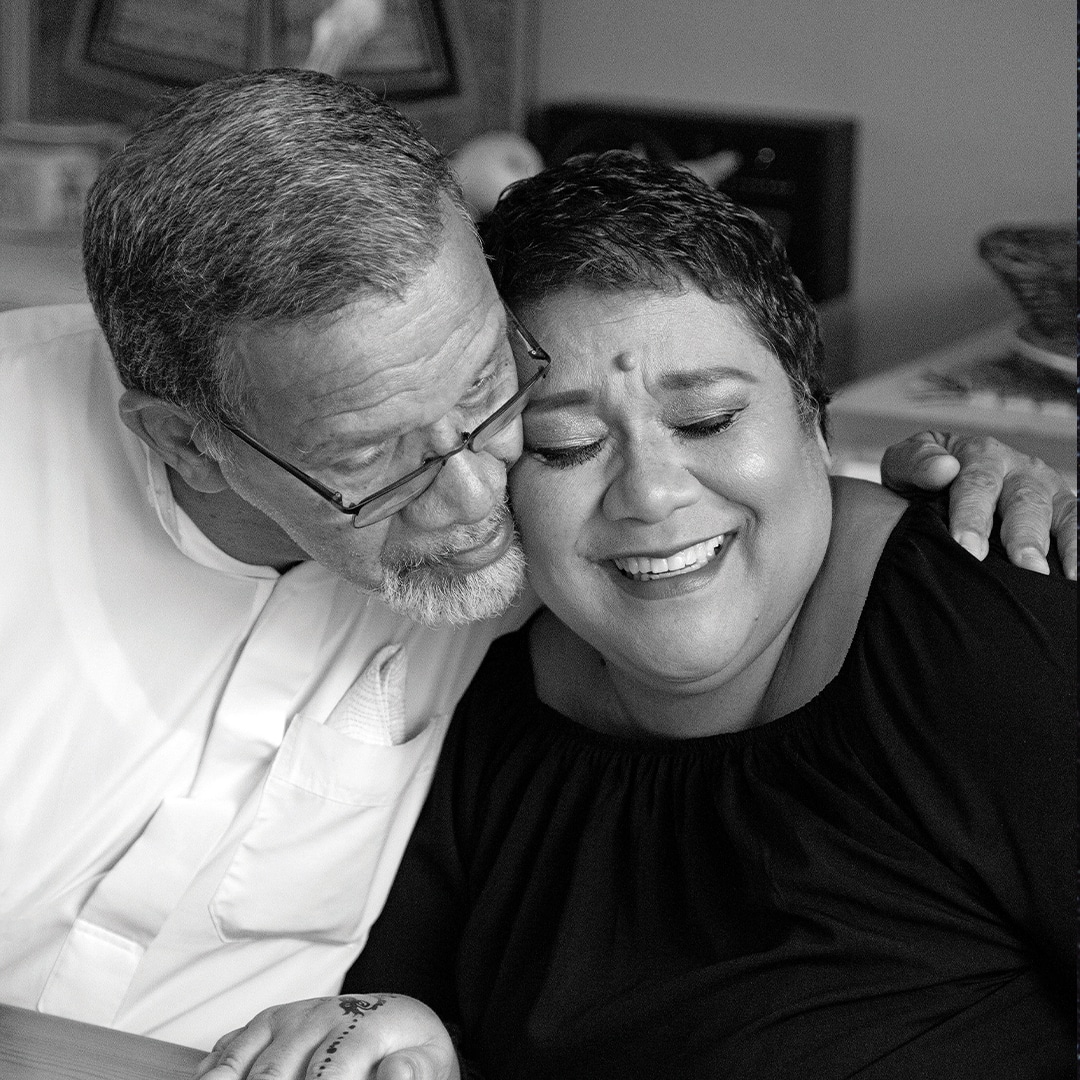
The use of everyday ingredients, simple methods as well as Fatima’s boundless energy and enthusiasm to keep sharing her culinary knowledge and heritage paved the way for her third cookbook: Fatima Sydow Cooks. In this book, tradition gets a modern twist, with some flavourful surprises in tow. The ability to add a modern twist to traditional cuisine is something only Fatima could do – from roti and curry pies to prawn chaat and so much more.
“Remember me through this cookbook, feel me on every page, in every story, word and picture. I love you all, and I hope I have made you proud and encouraged you to create your own beautiful pockets of memories with your loved ones. I will forever be in your hearts.” Fatima Sydow’s legacy will live on through every spice blend and every vibrant dish that graces our tables as a testament to her profound influence and enduring spirit. So let’s raise our forks and continue the culinary journey that she so beautifully began.
Fatima was extremely generous and compassionate. Loved her family and her dog, Sunny Boy, fiercely. Whenever I visited her, I never left empty-handed. She would even pack in barakat for my mom. Food was her love language. – Donna Lewis, photographer
Three-egg milk tart
Serves 8
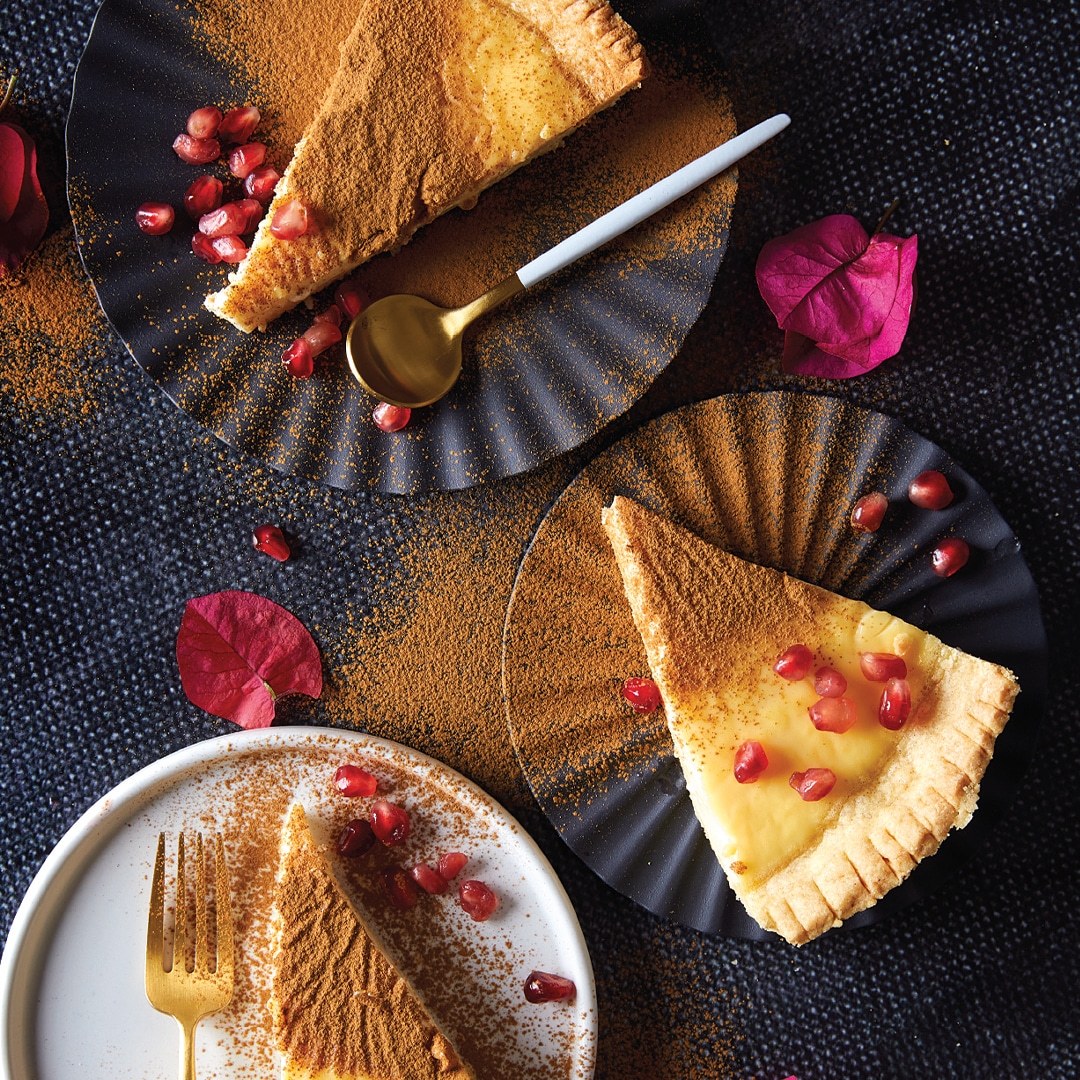
The craving for milk tart happens quite often in my house. But sometimes you only have three eggs. What to do? Ask mom of course. This is my late mother’s recipe. She was a lady who always made a plan and, before we knew it we would all have a piece of delicious milk tart in our hands.
Ingredients
¾ Cup (180g) butter
½ cup (125ml) sugar
1 egg, extra large
1 tsp (5ml) vanilla essence
2 ½ cups (625ml) cake flour
1 tsp (5ml) baking powder
For the custard filling
1 cup + 7 Tbsp (355ml) milk
1 Tbsp (15ml) custard powder
¼ cup (60ml) sugar
3 extra-large eggs
Pinch of ground cardamom
½ tsp (2.5ml) vanilla essence
½ tsp (2.5ml) ground cinnamon, for dusting
Method
- Preheat the oven to 180°C.
- In a mixing bowl or the bowl of an electric mixer, cream together the butter and sugar for about 2 minutes. Whisk in the egg and vanilla essence until combined.
- Gently fold in the flour and baking powder. By hand, mix the dough until smooth and the sides of the bowl are clean. Cover with cling wrap and chill in the fridge for 20 minutes.
- Grease a round 20-cm baking dish. Roll out the dough to about half a centimetre thick and line the dish with the dough. Ensure there are no holes in the base.
- Whisk together the custard ingredients, excluding the cinnamon, until smooth. Pour the mixture through a sieve and into a jug. Carefully pour the mixture into the prepared baking dish. Sprinkle the cinnamon over just before baking dish. Bake for 40 to 45 minutes until the custard is almost set. Cool completely before serving.
Bollas
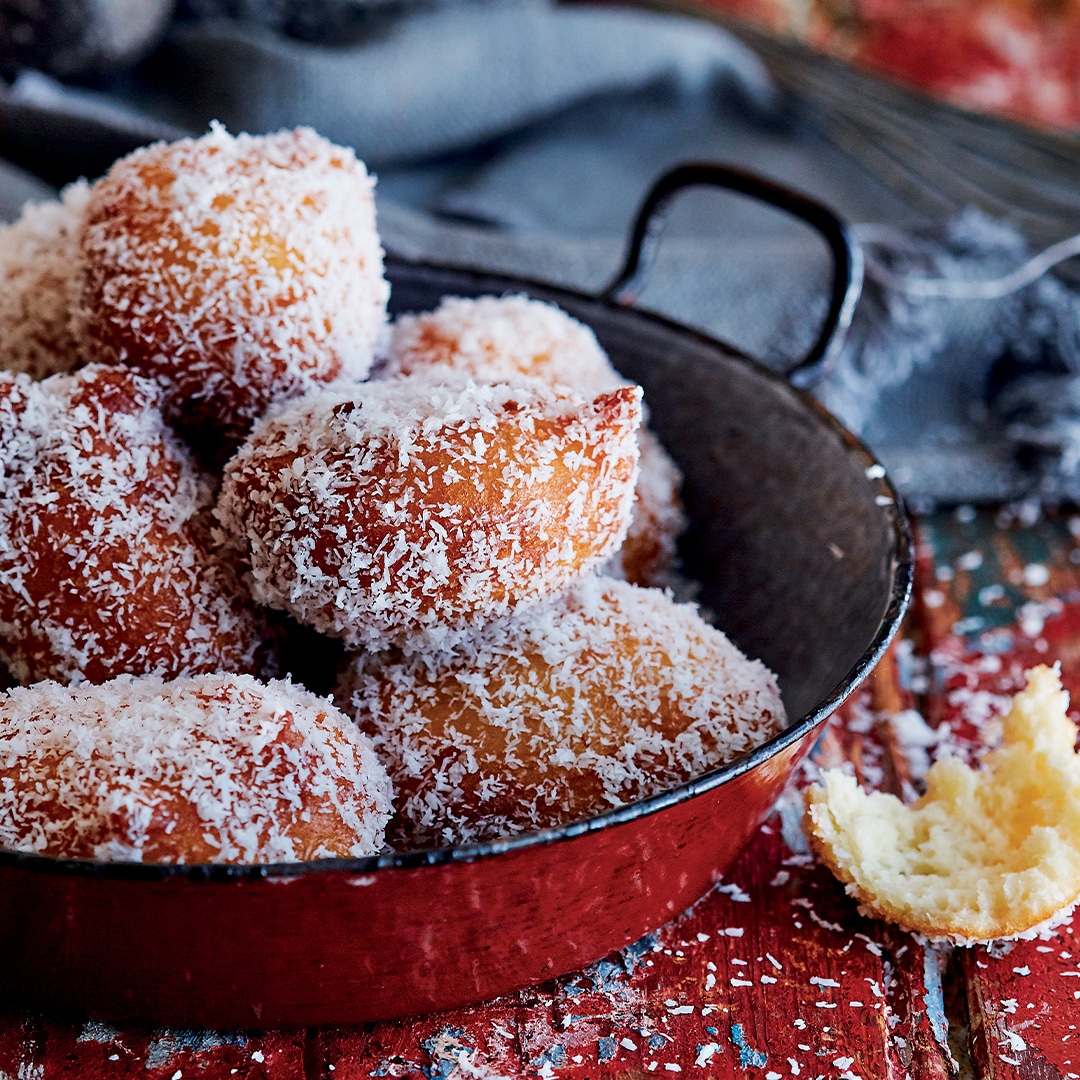
This delicious treat is basically a deep-fried thick vanilla cake batter that’s then dunked in sugar syrup and sprinkled with a light snowfall of desiccated coconut. Traditionally served during Ramadan, but they can be made throughout the year for a lovely Sunday afternoon treat.
Ingredients
½ cup (125ml) castor sugar
2 large eggs
5 Tbsp (75ml) oil
1 Tbsp (15ml) vanilla essence
2¾ Cup (700ml) cake flour
1 Tbsp (15ml) baking powder
1 ¼ cup (300ml) buttermilk
Oil for deep-frying
For the syrup
2 cups (500ml) water
2 cups (500ml) sugar
1 cup (250ml) desiccated coconut
Method
- In a large bowl, beat the castor sugar and eggs together until light and creamy. Next, add the oil and vanilla essence and whisk until fluffy. Sift in the dry ingredients, then add the buttermilk and mix until well combined. Cover the bowl of batter with plastic wrap or a tea towel and allow to rest for 30 minutes.
- Once ready, use a tablespoon to scoop up the batter. On medium to high heat, deep-fry the bollas in the oil until golden brown on each side. Remove with a slotted spoon and place on pieces of paper towel.
- In a separate pot, boil the water and sugar together for 15 minutes to make sugar syrup. Dunk the bollas into the warm syrup just once and remove with a slotted spoon. Sprinkle with desiccated coconut and serve.
Words by: Gail Damon
Photographs: Donna Lewis

